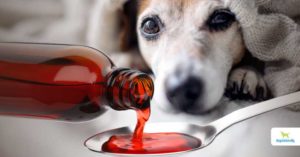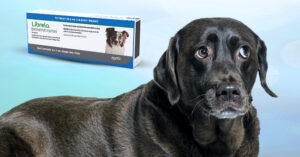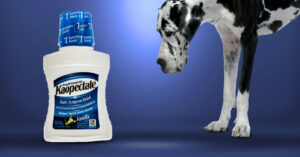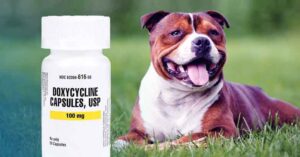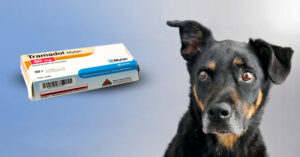Ulcers in dogs are painful and pet owners don’t want to see their dogs suffer. That’s why veterinarians will prescribe sucralfate to stop stomach acid from reaching the ulcer. But sucralfate for dogs isn’t always the best idea … especially when there are healthier alternatives.
What Is Sucralfate?
Sucralfate is an anti-ulcer agent that forms a barrier in the stomach to minimize stomach acid and prevent irritation to ulcers. It has minimal to no absorption because it forms a sticky viscose gel that adheres to the fluid excreted by the ulcer. It has a short-term effect, acting within an hour or 2 and lasting up to several hours … but it needs repeated doses to be effective.
What Is Sucralfate For Dogs?
Sucralfate is an off-label drug meaning the FDA has not approved it for use in animals but your vet can prescribe it. You’ll see it listed as Carafate® or Sulcrate®.
How Is Sucralfate Used In Dogs?
It’s used mainly for upper gastrointestinal ulcers in humans, cats, dogs, and other animals but can also be used for oral, esophageal and intestinal ulcers. It’s also used when there’s excess gastric acid from toxic chemical ingestion, liver disease, renal failure, cancer, IBD and mast cell tumors. Stress from trauma, shock, sepsis and burns can also lead to excessive stomach acid. And it can be used to prevent the possibility of ulcers from other medications like nonsteroidal anti-inflammatories (NSAIDs).
Stomach acid can be extremely painful if your dog has an ulcer. … so vets prescribe sucralfate. It’s given before meals to form a coating that prevents stomach acid from reaching the ulcer, prevents irritation and gives the ulcer time to heal.
If your dog is taking sucralfate, your vet needs to know if your dog is taking other drugs or supplements as there could be drug interactions or sucralfate can affect absorption.
But you should note … sucralfate does not heal or prevent ulcers, or reduce stomach acid. So if your dog is taking sucralfate and he has blood in his stool or vomit, they could be signs his ulcer is getting worse.
What Causes Ulcers In Dogs?
An ulcer is an open sore within the lining of your dog’s stomach. If your dog has irritable bowel syndrome, lymphoma or gastritis, he can develop an ulcer. If your dog is given aspirin (which is never a good idea) or other NSAIDs, they can also cause ulcers in dogs. The bacteria Helicobacter pylori (H pylori) is another common cause of stomach ulcers.
RELATED: Safe alternatives to aspirin for dogs …
Is Sucralfate Safe For Dogs?
There’s an often-quoted clinical trial on veterinary and retail websites that claims sucralfate was administered in huge amounts and found to be safe for dogs and other animals … but the specifics of this trial don’t appear in online searches to validate this information. However, a 1991 study in the American Journal of Medicine reported that sucralfate “provides a temporary substitute barrier” that enables the wound to repair. Human and animal studies report successful use of sucralfate in patients with ulcers when given in prescribed amounts.
Like all medications, it’s never a good idea to rely on them for long-term treatment to manage health problems in your dog. Most are designed to treat the symptoms, not the cause of the disease. But there are alternative remedies that can help your dog return to health, and we’ll discuss them a bit later.
Is Sucralfate Bad For Dogs?
Sucralfate can be a helpful, short-term solution while you get your dog’s ulcer under control. But you should be aware of the following:
- Sucralfate is not recommended for dogs with bone, kidney or brain concerns. That’s because long-term use of sucralfate can cause a build-up of aluminum that can accumulate in the brain or weaken bones.
- Sucralfate shouldn’t be used for longer than 8 weeks.
- Sucralfate can interfere with the absorption of other medications or supplements your dog is taking.
- Sucralfate needs to be carefully monitored in dogs with constipation as it can make it worse.
- Human diabetic patients have shown an increase in blood sugar levels but the effect on dogs is still unknown.
- There have been no studies on pregnant and nursing animals so the safety of sucralfate in these cases is unknown.
Side Effects Of Sucralfate For Dogs
Side effects are rare but there are some:
- Diarrhea
- Difficulty breathing
- Allergic reactions including rash, hives and itching
- Slow digestion and bowel elimination (constipation)
RELATED: Safe ways to manage constipation in dogs …
How To Give Sucralfate For Dogs
Sucralfate needs to be prescribed by a veterinarian so she’ll provide instructions for dosing specific to your dog and his condition. Sucralfate is available as a tablet and liquid and should be given on an empty stomach an hour or 2 before eating.
Emergency Use Of Sucralfate In Dogs
If your dog accidentally eats aspirin, an NSAID or something toxic, it’s an emergency situation and your veterinarian might prescribe sucralfate to prevent absorption in the stomach. There will also be other emergency steps to remove these toxins.
Natural Alternatives to Sucralfate In Dogs
A fresh, whole food, raw diet is the best way to support your dog’s health and avoid ulcers as it’s less taxing on your dog’s digestive system. In conjunction with the following suggestions, it can help maintain your dog’s good health, a strong immune system and manage any bacterial issues that might lead to an ulcer.
So, rather than go through the carousel of medications that treat ulcers and lead to their own side effects and more medications, here are natural ways to manage ulcers in dogs instead of (or in addition to) sucralfate.
Slippery Elm
This herb is a demulcent. It secretes mucilage to form a protective film that relieves mucous membrane irritation in the stomach lining and gastrointestinal tract. It helps relieve the burning sensation from heartburn and acid reflux caused when stomach acid flows back into the esophagus. And it has anti-inflammatory properties that can relieve intestinal inflammation caused by:
- Ulcers
- Colitis
- Gastritis
- Irritable bowel syndrome
- Crohn’s disease
RELATED: The benefits of slippery elm for dogs …
Probiotics
Probiotics are beneficial bacteria that support the microbiome in your dog’s gut, which also houses 90% of his immune system. These important microorganisms can help destroy H pylori and improve your dog’s recovery. You can include probiotic-rich foods in your dog’s diet including miso, fermented veggies and kefir. Probiotics need prebiotics so you can include foods like mushrooms, dandelion greens, garlic, asparagus and bananas.
You can give probiotic supplements but many are destroyed in the gut through the digestive process so you want to have a probiotic with at least 10 billion CFUs (colony forming units). And if your dog has immune or digestive problems, like an ulcer, you’ll want to be sure he gets 25-50 billion CFUs.
But …you can also give your dog S. boulardii, which is a yeast-based probiotic that’s hardier and will survive antibiotic use and the digestive system. Then you need to look for a half billion to 5 billion CFUs. Soil-based probiotics will also survive the acidity of the gut so you can look for about 1 billion CFUs.
RELATED: Learn more about soil-based probiotics for dogs …
Flavonoids
Flavonoids are powerful antioxidants found in many fruits and vegetables that can help the body fight H pylori. They can protect the stomach lining to allow ulcers to heal. Foods you can feed your dog include:
- Kale
- Broccoli
- Apples
- Berries
- Green tea
- Collard and dandelion greens
- Parsley and cilantro
Choose organic foods when you can.
Manuka Honey
Manuka honey is especially rich in polyphenols, antioxidants and antibacterial properties that support the immune system and fight H pylori bacteria. It’s also a prebiotic to nourish probiotics. As long as your dog isn’t diabetic, he can have Manuka honey to soothe an ulcer.
RELATED: Why you should use Manuka honey for dogs …
Licorice
This is not the candy version. You want deglycyrrhizinated licorice which is licorice without the sugar and sweetness. One study reports that deglycyrrhizinated licorice might help ulcers heal by limiting the growth of H pylori .
Sucralfate can provide needed relief to a dog in distress from a stomach ulcer, but it shouldn’t be the only treatment when diet and lifestyle changes can manage your dog’s long-term health.
References:
- Hill, Tracy L. et al. Effect of sucralfate on gastric permeability in an ex vivo model of stress-related mucosal disease in dogs. J Vet Intern Med. 2018 Mar;32(2):670-678.
- Mal, A., et al. Administration of sucralfate prolongs survival of animals with experimental peptic ulceration. Am J Med. 1991 Aug 8;91(2A):37S-42S.
- Sumbul, Sahiha, et al. Role of phenolic compounds in peptic ulcer: An overview. J Pharm Bioallied Sci. 2011 Jul-Sep; 3(3): 361–367.
- Asha, Mannanthendil Kumaran, et al. In vitro anti-Helicobacter pylori activity of a flavonoid rich extract of glycyrrhiza glabra and its probable mechanisms of action. J Ethnopharmacol. 2013 Jan 30;145(2):581-6.




